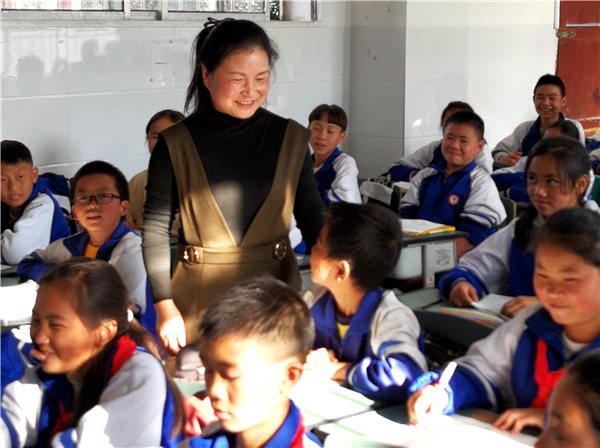Light of her mind


In 1997, married for about two years and with an 8-month-old son, Liu Fang was teaching Chinese language in a middle school in Guizhou province, and was on a path she had picked for herself. The going was good until she was diagnosed with retinitis pigmentosa, a genetic disease that gradually leads to loss of sight.
"When the doctor told me there was no medicine or surgery for it, my mind went blank and my legs felt like they had turned into jelly," Liu said, adding that the 5-kilometer journey from hospital to her home that day was the longest ever.
She had no idea about how to continue with her life and work.
Liu had moved to suburban Guiyang, the provincial capital, with her parents at age 5. From primary to high school, Liu had been appreciated by her teachers for her writing skills, so becoming a Chinese teacher had always been her dream. In 1993, after she graduated from Guiyang University, Liu started teaching in a middle school in the city.
Guizhou is one of the country's least developed areas.
At that time, most students in Liu's class were "left behind" at home, as their parents tried to make a living through jobs in other cities.
When she was diagnosed with the disease, Liu was making progress with her students by encouraging them to like school better and study harder so as to be able to use the learning as an opportunity for children from poverty-stricken families to change their destiny.
"In my opinion, people who have a job are happy. If your job happens to be your ideal one, it will make you happier," Liu said, adding that the latter applies to her.
As an enthusiastic person with many hobbies such as singing and painting, Liu made her classes engaging and lively during which the students enjoyed a lot, she said. For example, she would encourage her students to memorize ancient poems by singing them like songs.
Then Liu made a decision. She continued teaching with her remaining sight as if the disease didn't exist. She described that time as a "shock period" when she was barely hanging on, as only her deep attachment to work and a sense of pride supported her mentally.
As the disease nibbled her vision slowly, yuwen, the two characters printed on the textbook cover meaning "Chinese language" became two black spots that Liu could only see clearly if she put her face close to the book.
Her students and colleagues didn't realize that something was wrong with Liu as she knew the contents of the textbooks and always had her teaching plans ready. She could give marks or her comments to students after they read aloud in class as she had done before the diagnosis.
"I was like a caterpillar that used colorful bristles to keep my fragility and helplessness undiscovered," Liu said.
She refused to accept any sympathy from others. However, Liu got mental support from her students, whose minds are simple and hearts kind, she said. She felt comfortable at school.
In 2006, Liu was completely engulfed by darkness. Having learned to deal with inconveniences in life and work over 10 years of losing sight, she decided to accept her situation and received legal recognition by applying for a disability certificate from the China Disabled Persons Federation.
"In my world, the sky had suddenly opened up and I felt like a butterfly that finally broke free and was ready to receive the kindness of others."
Though it was the biggest regret in Liu's life that she could not continue teaching Chinese, she chose to become a mental health counselor on campus in 2007.
"I was only 36 years old then. It was unimaginable that I would simply go home and sit around every day," she said.
However, psychological counseling was not common in primary and middle schools in rural areas of Guizhou and many students held the wrong view that only "abnormal students" would visit the counselor's room.
Liu mobilized her communication skills, telling the students that the counseling room was a safe space where they could talk to her about anything that bothered them but couldn't share with their parents.
From the 40-square-meter "Liu Fang studio," as named by the local education authorities, Liu has provided on-campus counseling to more than 10,000 students since 2007.
"I am adept at accepting kids who consider themselves to be imperfect and unworthy of being loved, and offer them love and care," Liu said.
A major difference between a Chinese language teacher and a psychological counselor is that she no longer is the one talking more, but rather listening, she said.
To get more people to realize the importance of mental health education among children, especially in rural areas, Liu has many ways of providing psychological counseling, from giving lectures, holding radio programs to writing books with the help of software.
Her audience has expanded to teachers and parents.
In 2009, Liu received a government award as a "national outstanding teacher". In 2016 and 2019 respectively, she was honored with the titles of "role model of the times" and "role model of dedication" for her decades of persistent dedication to education in rural areas.
"A river is called a river when it runs above the ground. A river remains a river even if it flows underneath the surface. Finally, both rivers flow to the sea and their souls are on an equal footing," Liu wrote in her novel Shiliu Qingqing, or Green Pomegranates.




































